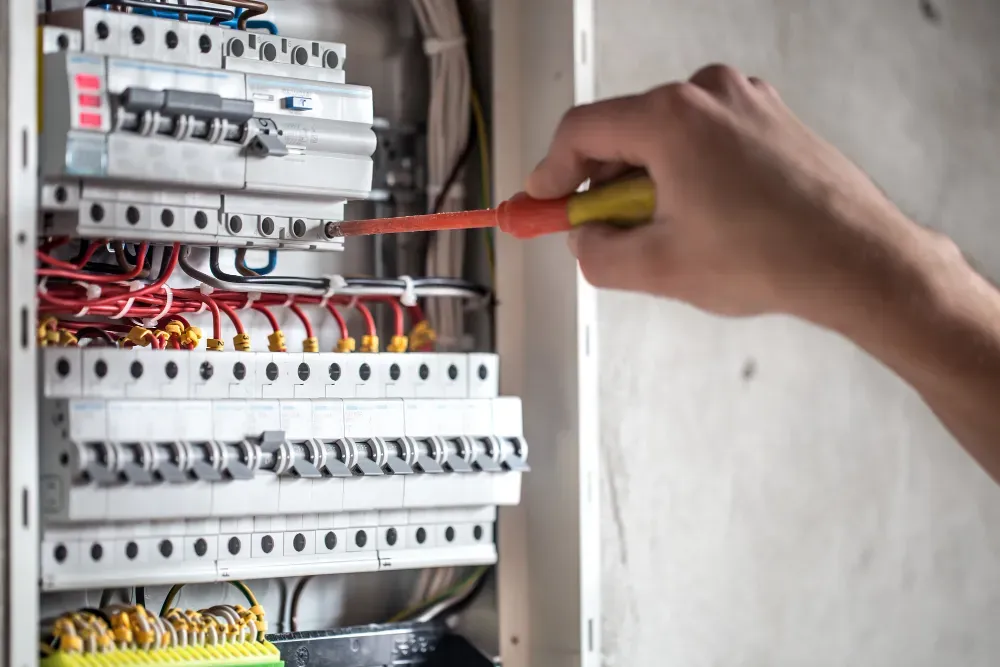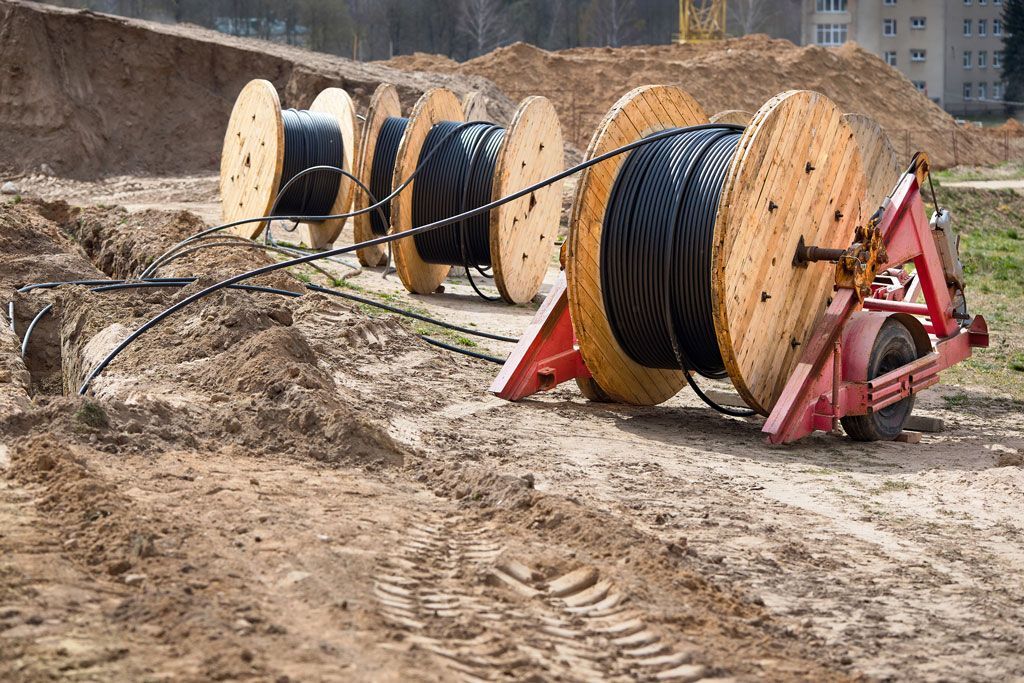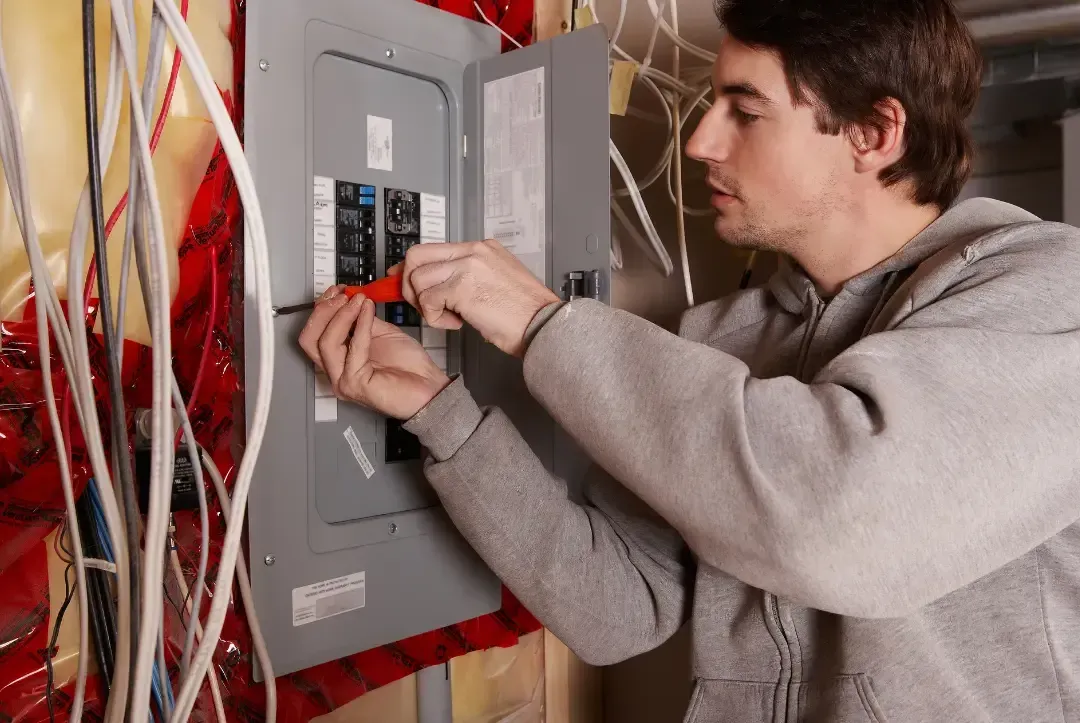(682) 582-5500
info@atelectricllc.com
What Causes a Circuit Breaker to Trip? A Homeowner's Guide
A.T. Electric LLC is a family-owned and operated electrical services provider based in Mansfield, Texas, serving the communities of Mansfield, Arlington, and the entire Dallas-Fort Worth (DFW) area since 2019. They are committed to delivering exceptional electrical solutions for both residential and commercial properties, with a strong focus on safety and customer satisfaction.
Top Three Services:
- Electrical Panel Upgrades: A.T. Electric LLC offers expert electrical panel upgrade services to ensure homes and businesses can handle increased power demands safely and efficiently. Upgrading the electrical panel not only boosts safety but also improves the overall efficiency of the electrical system.
- Indoor and Outdoor Lighting: They provide custom indoor and outdoor lighting solutions that enhance the aesthetics, functionality, and security of properties. Their installations are designed to transform spaces with tailored lighting designs.
- Whole Home Surge Protection: A.T. Electric LLC offers comprehensive whole-home surge protection services to safeguard appliances and electronics from unexpected power surges. Their systems are designed to preserve the longevity of valuable investments, providing peace of mind to homeowners.

Have you ever been in the middle of microwaving dinner when suddenly the kitchen goes dark? Or maybe you've plugged in your hairdryer and watched half the bathroom lights shut off? If so, you've experienced a tripped circuit breaker. While frustrating, these electrical interruptions are actually keeping you safe. Let's explore why circuit breakers trip and what you can do about it.
Understanding Your Home's Electrical System
Before diving into why circuit breakers trip, it helps to understand what they do in the first place.
How Circuit Breakers Protect Your Home
Think of circuit breakers as safety guards for your home's electrical system. They monitor the amount of electricity flowing through your wires. When too much current flows—which can cause fires or damage appliances—the breaker "trips" and cuts off power to that circuit.
Circuit breakers are your first line of defense against electrical fires. Without them, overheating wires could melt and start fires inside your walls where you can't see them until it's too late.
Types of Circuit Breakers in Residential Buildings
Most homes have one of these common types of circuit breakers:
- Standard breakers: These handle regular household current and trip when overloaded
- GFCI (Ground Fault Circuit Interrupter) breakers: These protect areas with water like kitchens and bathrooms
- AFCI (Arc Fault Circuit Interrupter) breakers: These detect dangerous electrical arcs that can cause fires
Newer homes often have more advanced breakers that offer better protection. If your home is older, you might have an outdated electrical panel that needs updating.
Common Reasons Why Circuit Breakers Trip
Now let's look at the main culprits behind those annoying power cutoffs.
Overloaded Circuits: Too Many Devices
The most common reason for tripped breakers is circuit overload. This happens when you plug in too many devices that draw more power than the circuit can handle.
For example, a typical kitchen circuit might be rated for 20 amps. If you run your microwave (drawing 12 amps), coffee maker (8 amps), and toaster (6 amps) at the same time—that's 26 amps total! Your breaker will trip because the wires would overheat if it allowed that much current to flow.
Common overload culprits include:
- Space heaters
- Hair dryers
- Air conditioners
- Multiple kitchen appliances running simultaneously
- Too many lights and electronics on one circuit
Short Circuits: When Wires Touch
Short circuits happen when a "hot" wire touches either a neutral wire or a ground wire. This creates a direct path with almost no resistance, causing a sudden surge of current.
Short circuits can be caused by:
- Damaged appliance cords
- Loose wire connections
- Water damage to wiring
- Faulty switches or outlets
- Worn insulation on wires
Short circuits are more dangerous than overloads because they can happen suddenly and cause sparks or even fires.
Ground Fault: Electricity Finding Alternate Paths
A ground fault occurs when a hot wire touches something metal that's connected to the ground. This could be a metal box, appliance frame, or even plumbing pipes.
Ground faults are especially dangerous in wet areas like bathrooms and kitchens. If you touch a device with a ground fault while standing on a wet floor, you could get a serious shock.
That's why modern building codes require GFCI protection in kitchens, bathrooms, garages, and outdoor outlets.
Arc Faults: Dangerous Electrical Jumps
Arc faults happen when electricity "jumps" across a gap in a wire connection. This creates heat that can easily start fires.
Common causes of arc faults include:
- Damaged wires (from nails, screws, or pests)
- Loose wire connections
- Old or deteriorated wiring
- Wires pinched by furniture
- Overheated outlets
Modern AFCI breakers can detect these dangerous arcs and shut off power before a fire starts.
Signs Your Circuit Breaker Needs Attention
Your electrical system often gives warning signs before major problems occur.
Warning Signs Before a Trip Occurs
Watch for these red flags:
- Lights that flicker or dim when appliances turn on
- Buzzing sounds from outlets or switches
- Warm or discolored outlet covers
- Burning smells near the electrical panel
- Frequent tripping with no obvious cause
- Tingling sensation when touching appliances
These symptoms shouldn't be ignored. They often signal wiring problems that could lead to more serious issues.
When to Call a Professional Electrician
While some electrical problems can be fixed by homeowners, others require professional help. Call an electrician if:
- A breaker trips immediately after resetting it
- You notice any burning smells
- There's visible damage to the electrical panel
- The breaker itself feels hot to touch
- You have aluminum wiring (common in homes built 1965-1973)
- Your home is over 40 years old with the original panel
Professional electricians have the tools and training to diagnose complex electrical problems safely.
DIY Troubleshooting for Tripped Breakers
When a breaker trips, you can often resolve the issue yourself with some simple steps.
Safety First: Precautions Before You Begin
Before touching your electrical panel:
- Make sure your hands and feet are dry
- Stand on a dry surface
- Remove any metal jewelry
- Use a flashlight if the area is dark
- Never force a breaker that resists resetting
Remember, electricity can be dangerous. If you feel uncomfortable working with your electrical panel, call a professional.
Step-by-Step Reset Process
Resetting a tripped breaker is usually straightforward:
Identifying the Tripped Breaker
Look at your electrical panel for a breaker that's not in the same position as the others. A tripped breaker usually sits between the ON and OFF positions or shows a red indicator.
Some older panels might have fuses instead of breakers. If you have fuses, a blown fuse will have a broken metal strip inside or look discolored.
Proper Reset Technique
- First, turn off or unplug appliances on the affected circuit
- Push the breaker fully to the OFF position
- Then firmly push it back to the ON position
- If it trips again immediately, there's a serious problem—call an electrician
After resetting, plug in devices one at a time to see which one might be causing the problem.
Preventing Future Circuit Breaker Issues
The best way to handle electrical problems is to prevent them from happening in the first place.
Smart Home Usage to Avoid Overloads
To prevent overloading circuits:
- Know which outlets are on which circuits
- Spread high-power devices across different circuits
- Run power-hungry appliances (like vacuums and hair dryers) one at a time
- Use power strips with surge protection, but don't overload them
- Consider using timer switches for devices that don't need to run constantly
Many modern smart home systems can even monitor your electrical usage and alert you to potential overloads before they happen.
Regular Electrical Maintenance Tips
Just like your car needs regular maintenance, so does your electrical system:
- Test GFCI outlets monthly using their test buttons
- Inspect cords and plugs for damage
- Check for loose outlet covers or switches
- Keep your electrical panel clean and accessible
- Have a professional inspection every 3-5 years
Good maintenance can catch small problems before they become dangerous—and expensive—emergencies.
When to Upgrade Your Electrical Panel
Older homes often have electrical systems that weren't designed for today's electronics. Consider upgrading your panel if:
- Your home is over 30 years old with the original panel
- You have a fuse box instead of circuit breakers
- You have fewer than 100 amps of service
- You're adding large appliances or making renovations
- You frequently trip breakers despite careful usage
A panel upgrade typically costs $1,000-$4,000 but provides peace of mind and better protection for modern electrical needs.
Emergency Situations: When to Get Immediate Help
Some electrical problems require emergency attention. Call an electrician right away if:
- You smell burning plastic or see smoke
- A breaker trips with a loud pop or flash
- You see sparks from outlets or switches
- Circuit breakers feel hot to the touch
- You experience mild shocks from appliances
- Power is out to critical medical equipment
Don't wait to address these issues—electrical fires can spread quickly inside walls where you can't see them.
For true emergencies, like visible electrical fires, call 911 first, then try to turn off power at the main breaker if it's safe to do so.
Understanding Your Home's Electrical Needs
Every home has different electrical requirements based on size, age, and how many devices you use. A small apartment might function fine with a 60-amp service, while a large modern home might need 200 amps or more.
To understand your home's electrical capacity:
- Look at the main breaker in your panel (it will show the total amperage)
- Consider how many high-power devices you use regularly
- Note how often breakers trip during normal use
If you're constantly resetting breakers, your electrical system probably needs attention from a professional.
When to Tackle Electrical Projects Yourself
While some electrical work requires a professional, homeowners can safely handle:
- Replacing outlet covers
- Installing basic light fixtures
- Swapping out standard switches
- Replacing damaged cords or plugs
- Resetting tripped breakers
Always turn off power at the breaker before attempting any DIY electrical work. And if you're not 100% confident, hire a professional—the cost of an electrician is much less than the cost of an electrical fire.
Finding a Qualified Electrician
When you need professional help, look for an electrician who:
- Is licensed, bonded, and insured
- Has good reviews from past customers
- Provides written estimates before starting work
- Pulls proper permits for larger jobs
- Specializes in residential service work
A good electrician will not only fix your immediate problem but also check for related issues that could cause future problems.
Conclusion: Safe Electrical Systems for Happy Homes
Circuit breakers may seem like an inconvenience when they trip, but they're actually heroes protecting your home from electrical dangers. By understanding why they trip and taking proper precautions, you can keep your electrical system running safely and efficiently.
Remember these key points:
- Circuit breakers trip to prevent electrical fires and other dangers
- Overloaded circuits are the most common cause of tripping
- Warning signs like flickering lights shouldn't be ignored
- Regular maintenance helps prevent electrical problems
- Know when to call a professional for electrical issues
With proper care and attention to your electrical system, you can avoid many common problems and keep your home safe for years to come.




Everything You Need to Know About A.T. Electric LLC Services: Your Trusted Mansfield, TX Electrician




